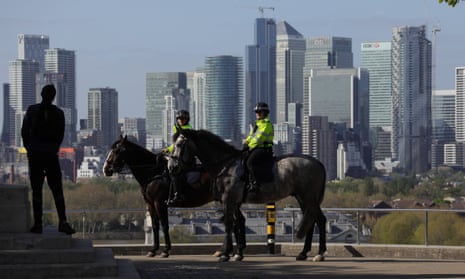A 21-year-old man has been wrongly convicted under coronavirus laws, the Metropolitan police have admitted, as concerns grow over the use of emergency powers.
Confirmation that the man’s £60 penalty had been cancelled came as the National Police Chiefs Council (NPCC) promised to publish fresh data this week on the number of fines imposed across the country.
At the weekend, Martin Hewitt, the chair of the NPCC, revealed at least 1,084 fines had been issued for breaching coronavirus regulations up until last Thursday.
The Met’s mistake relates to a case involving a man arrested outside Tooting leisure centre in south-west London on 28 March. The defendant was charged with breaching the Coronavirus Act 2020 as well as with possession of class B drugs and “going equipped to steal”. He pleaded guilty to all the charges at Wimbledon magistrates court.
A force spokesman said: “It was identified this legislation had been applied incorrectly. The [coronavirus] charge and fine were subsequently set aside. The charges for possession of class B drugs and going equipped to steal were not overturned and the £200 fine stands.
“In this case, officers were rightly dealing with an individual suspected of a separate crime and who was also in a public space without a valid reason. However, [he] was incorrectly charged with an offence under the Coronavirus Act 2020. This legislation only relates to ‘potentially infectious persons’, which was not applicable in these circumstances.”
The spokesman said Scotland Yard had been working with frontline officers to help them interpret and understand the new legislation. “The officers involved have been spoken to and reminded of the way the legislation should be applied.”
The force said another case involving a 15-year-old boy charged under the coronavirus law was being reviewed by the Crown Prosecution Service.
Kevin Blowe, of the monitoring organisation Netpol, said he was aware of people being told off by officers for being out but not taking exercise, when they were legitimately returning home from shopping. Others had been criticised for sitting down to rest on their way home.
“In most of these cases people were not fined,” he said. “People are terrified of an encounter with the police when they don’t understand what [the rules are].”
Blowe said there were inconsistencies in the way different forces were using the emergency powers. “Lancashire police handed out more than 120 fines in the first two days … People can appeal against fines but the courts won’t be getting around to hearing any cases for a long time.”
Most of the fines appear to have been imposed under the 2020 Health Protection Regulations but Blowe said he was worried about future use of the Coronavirus Act to control those suspected of being infected in public places once the lockdown had ended, with neighbours “pointing the finger” at people they believed were unwell.
Over the weekend, a defence solicitor, Steve George, tweeted about a client who spent two nights in police cells after being arrested for eating biscuits on a bench: he had told officers to “take a hike”.
The director of public prosecutions, Max Hill QC, said last week: “We recently launched our interim charging protocol where we set out that any offending related to coronavirus will be treated as the highest priority, and we will not hesitate to bring offenders to justice.”
Silkie Carlo, the director of Big Brother Watch, said: “It’s astonishing that after a string of damaging failures, the emergency legislation is still being misused. These sweeping powers to fine and detain people are so broad that police may try to apply them to any one of us.”
Gracie Bradley, the policy and campaigns manager of Liberty, said “We’re concerned there’s confusion about the extraordinary coercive powers the police have been handed in response to this public health crisis.
“Every wrongful use of these powers harms the people involved and undermines public trust in the authorities, which is vital for protecting public health. There needs to be a clear focus from the government on educating the public and facilitating compliance, rather than sweeping powers which pave the way to heavy-handed policing.”
